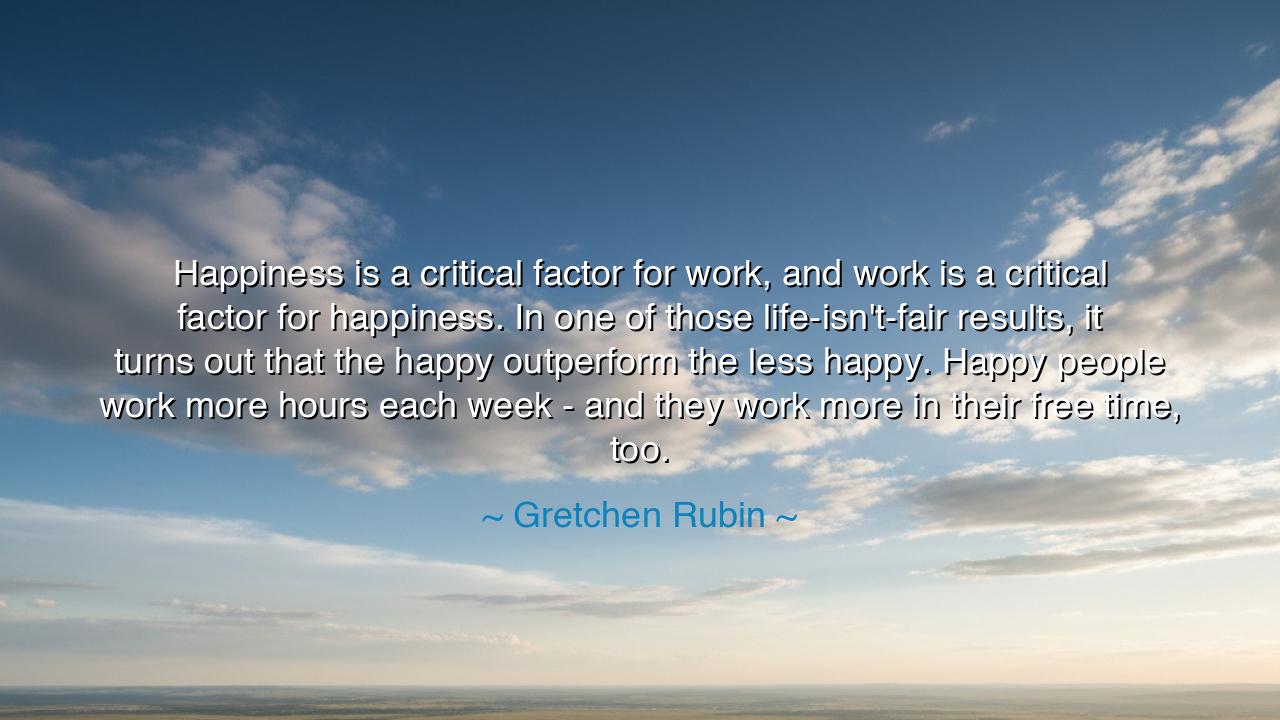
Happiness is a critical factor for work, and work is a critical
Happiness is a critical factor for work, and work is a critical factor for happiness. In one of those life-isn't-fair results, it turns out that the happy outperform the less happy. Happy people work more hours each week - and they work more in their free time, too.






“Happiness is a critical factor for work, and work is a critical factor for happiness. In one of those life-isn't-fair results, it turns out that the happy outperform the less happy. Happy people work more hours each week — and they work more in their free time, too.” — Thus spoke Gretchen Rubin, a seeker of the human spirit, who peered into the mysterious harmony between joy and labor. Her words remind us that happiness and work are not rivals, but twin forces in the shaping of a meaningful life. For the ancient masters always taught that man was born not for idleness, but for purpose, and that purpose, when joined with joy, becomes divine.
Too often do people imagine happiness as rest — as the cessation of struggle, the absence of duty. Yet the wise know that this is but a shadow of true joy. The heart of happiness beats not in the stillness of avoidance, but in the rhythm of creation. To work is to engage with the world, to draw something from the realm of thought into the realm of being. The potter’s hand upon the clay, the writer’s pen upon the page, the farmer’s blade upon the soil — these are not burdens but acts of worship. And when done with love, even toil becomes a song.
In the world of the ancients, this truth was sacred. The philosopher Aristotle taught that eudaimonia — the highest form of happiness — is not pleasure, but activity in accordance with virtue. It is the happiness of a soul fulfilling its purpose, of labor animated by excellence. Thus, Rubin’s wisdom echoes that of the old philosophers: the happy do not work because they are forced to, but because their spirit longs to give shape to its own potential. And in that giving, they find joy.
Yet life, as Rubin observed, is rarely fair. The paradox of existence is that those who already possess happiness seem to reap more of its fruits. They labor longer, not from compulsion but from delight. For them, work is not a punishment but a playground. Their energy flows freely, their vision is bright, and their hearts unburdened by bitterness. The unhappy, weighed down by resentment or fear, struggle not only with their tasks but with themselves. Thus, it is not fate that divides them, but attitude — the quiet alchemy of the heart that turns effort into meaning.
Consider the tale of Beethoven, the great composer. Deafness, the cruelest fate for a musician, might have broken a lesser man. Yet he did not surrender to despair. His suffering became his forge, and through it he created music that spoke not of loss, but of triumph. In his labor, he found a strange joy — a happiness born of creation itself. His work did not merely survive his pain; it transformed it. Here lies Rubin’s truth revealed in timeless form: happiness is both the fuel and the fruit of meaningful labor.
In the modern age, men and women chase leisure as if it were salvation. They seek escape from work, dreaming of endless rest. But the spirit grows restless in idleness, and joy withers without purpose. To work well, one must first live well; to live well, one must work with purpose. The circle is complete, each feeding the other. Those who learn to love their labor discover that their days become brighter, their hearts lighter, and their dreams nearer to their grasp.
The lesson of this teaching is both simple and profound: cultivate joy in your labor, and your labor will cultivate joy in you. Do not seek happiness as a reward after work, but as a companion during it. Let each task — however humble — be done with care, attention, and gratitude. For the farmer who sows in peace will reap in abundance, and the artisan who loves his craft will never tire of his tools.
So remember this, my child: Happiness and work are the two wings of the same bird. To neglect one is to cripple the other. Do not flee from effort — sanctify it. Do not wait for joy — weave it into your days. When you rise each morning, greet your labor not as a burden but as a blessing, and your heart will learn the secret that Gretchen Rubin revealed: that the happiest souls are not those who rest from life, but those who work in harmony with it.






AAdministratorAdministrator
Welcome, honored guests. Please leave a comment, we will respond soon